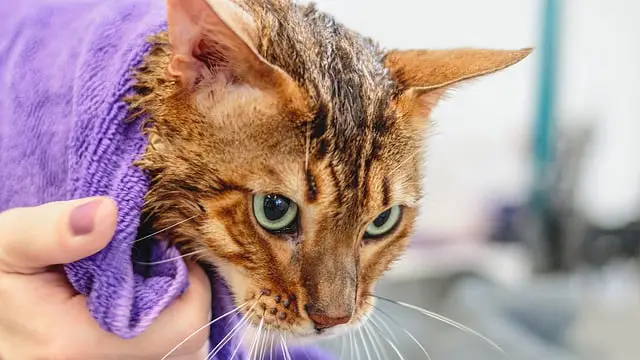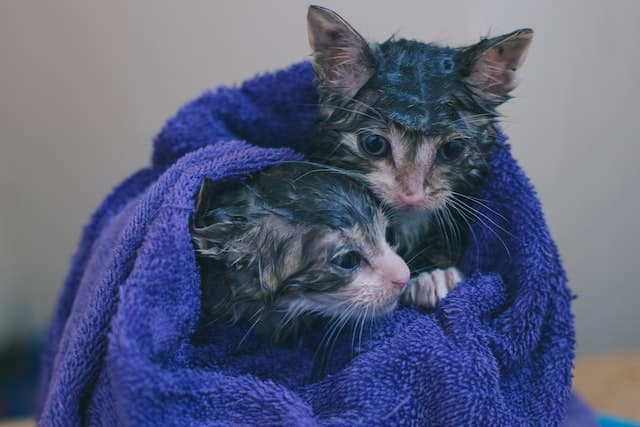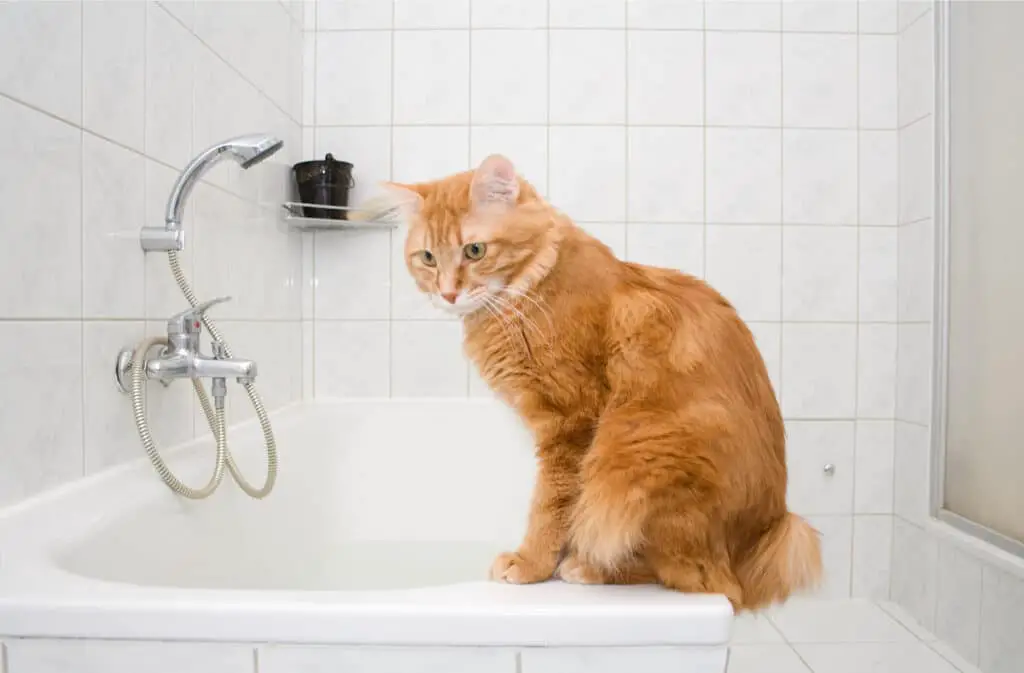Cats are generally known for being clean creatures, and many people wonder if they really need to be given baths. After all, cats are responsible for grooming themselves, unlike dogs, who need regular baths to stay clean and healthy. So, do cats need baths? The answer depends on the individual cat, their needs, and the type of environment they live in.
When to Bathe Your Cat
1. When your cat starts to smell bad
An occasional bath is important to keep your cat clean and smelling fresh. If you start noticing a strong odor, give your cat a bath.
2. When your cat starts to shed excessively
Long-haired cats may need a bath more often than short-haired cats. If your cat starts to shed excessively, a bath can help remove excess fur before it starts to mat.
3. When your cat is suffering from skin problems
If your cat is suffering from skin problems such as dandruff or irritation, giving them a bath can help remove any dirt or allergens that may be aggravating the issue.
4. When your cat has fleas
If your cat has fleas, giving them a bath can help remove the fleas and any eggs they may be carrying. Make sure to use a flea shampoo specifically made for cats and follow the instructions carefully.
5. When your cat is dirty
If your cat gets into something particularly messy, a bath can help get them clean. This could include things like paint, motor oil, or anything else that may be difficult to remove from their fur.
6. When your cat is grooming itself excessively
If your cat is grooming itself excessively, this may be a sign of stress or anxiety. Giving them a bath can help reduce their stress levels and help them relax.
7. When you need to get your cat used to baths
If your cat is not used to being bathed, it is important to get them used to it. Start by introducing them to the bath slowly, letting them explore the area and get comfortable with the new experience.
8. When your cat is due for a physical
If your cat is due for a physical, giving them a bath beforehand can help make the appointment go more smoothly. It is also a good idea to brush their fur before the appointment to help reduce the amount of fur flying around the room.

When Not to Bathe Your Cat
One of the most important things to remember when it comes to bathing your cat is that it’s not always necessary. In fact, cats are typically quite good at keeping themselves clean and rarely need a full bath. Over-bathing can strip away natural oils from your cat’s fur and skin, leading to dryness and irritation. If your cat is healthy and has no fleas or other parasites, it likely doesn’t need a bath.
If your cat has long hair, it’s a good idea to brush it regularly to prevent tangles and mats. If your cat does get matted fur, it’s best to take it to a professional groomer to be taken care of. Regular brushing will also help to keep your cat’s fur shiny and healthy, and can help to reduce shedding as well.
In addition, cats with certain medical conditions may not be able to tolerate a bath. For example, cats with diabetes, kidney disease, or heart disease may be more sensitive to the stress of a bath and would be better off avoiding it. Make sure to consult with your veterinarian if you have any questions about whether or not your cat should be bathed.
Benefits of Bathing Your Cat
- Keeps Your Cat’s Fur Clean and Healthy: Regular baths can help keep your cat’s fur clean and free of dirt, debris, and excess oil. This can help prevent skin and coat problems that can be caused by an accumulation of dirt and oil, as well as keep your cat smelling fresh and looking great.
- Helps Control Parasites: Fleas and ticks can be a problem for cats, especially those that spend time outdoors. Bathing your cat regularly can help reduce the number of parasites they have, which can help keep your pet healthy and free of itchy and uncomfortable bites.
- Prevents Infections: Regular baths can help keep your cat’s skin clean and free of bacteria and other germs that can cause infections. This can help keep your cat healthy, and can also help reduce the risk of your cat spreading any infections to you or other pets in the household.
- Can Help Reduce Shedding: Regular baths can help reduce shedding by removing excess dirt and debris from your cat’s fur. This can help reduce the amount of fur that your cat sheds in your home and on your furniture, while also helping to keep your cat’s coat looking healthy and full.
- Can Help Reduce Anxiety: Bathing your cat can help reduce anxiety, as the warm water and the gentle massage of the bath can help your cat relax and feel more calm. This can be especially helpful for cats that are anxious about being handled or are scared of water.
- Helps Keep Fur Soft and Shiny: Regular baths can help keep your cat’s fur soft and shiny. This can help keep your cat looking its best, as well as make it more pleasant to cuddle and snuggle with your cat.
- Can Help Reduce Odors: If your cat has an unpleasant odor, regular baths can help reduce or eliminate the smell. This can keep your home smelling fresh, and can help you avoid any embarrassing odors when you have company over.
- Can Help Reduce Hairballs: Bathing your cat can help reduce the amount of hair that your cat swallows when grooming itself, which can help reduce the number of hairballs your cat produces. This can help keep your cat healthier and more comfortable, as well as help keep your home clean and free of hairballs.

How to Bathe Your Cat
If you decide that your cat needs a bath, it is important to know how to do it properly.
- Gather the Supplies: Before you begin bathing your cat, make sure you have all the supplies you’ll need. You’ll need a container large enough to hold your cat, a towel, a cat shampoo, a sponge or washcloth, and a comb or brush.
- Fill the Container with Warm Water: Fill the container with warm water and place it in the sink or bathtub. Make sure the water is not too hot or too cold.
- Place the Cat in the Container: Gently pick up your cat and place her in the container of warm water. You may need to use a towel to help keep your cat from slipping.
- Wet Your Cat with the Water: Use your hand or a washcloth to slowly wet your cat’s body with the warm water. Make sure to avoid getting water in your cat’s ears, nose, and eyes.
- Apply the Cat Shampoo: Squeeze a small amount of cat shampoo into your hand and lather it onto your cat’s fur. Make sure to massage the shampoo into your cat’s fur, avoiding the face and eyes.
- Rinse Your Cat Thoroughly: Rinse your cat thoroughly with warm water. Make sure all of the shampoo is removed from your cat’s fur.
- Dry Your Cat: Wrap your cat in a towel and gently pat her fur dry. You may also use a blow dryer set to the lowest setting to help speed up the drying process. Make sure the air is not too hot.
- Comb or Brush Your Cat’s Fur: Use a comb or brush to detangle your cat’s fur and remove any loose fur.
- Reward Your Cat: Give your cat a treat for being a good sport during the bath. This will help make the experience more enjoyable for your cat and you.
- Monitor Your Cat for Irritation: After your cat’s bath, monitor her for any signs of irritation or discomfort. If you notice any redness, itchiness, or other signs of irritation, contact your veterinarian as soon as possible.
Conclusion
In conclusion, the answer to the question of whether cats need baths is not a simple one. While cats are generally self-cleaning, there may be times when bathing is beneficial. However, it is important to remember that over-bathing can strip the skin of natural oils, so it is best to consult with your veterinarian before giving your cat a bath. Additionally, kittens should not be bathed until they are at least six months old, as their skin and fur are still developing. If you decide that a bath is necessary, make sure to use the proper supplies and technique to ensure the safety and health of your pet.
FAQs: Do Cats Need Baths?
The answer is a resounding “No.” For the most part, cats are self-sufficient groomers and don’t need any help from their humans with their hygiene. In fact, cats are known for their meticulous grooming habits and are able to keep themselves clean and healthy without any help.
However, there are some instances when giving a cat a bath is necessary and appropriate. For instance, if your cat has gotten into something they shouldn’t have, such as a skunk, then a bath is in order. Similarly, if your cat has been exposed to a toxic substance, such as antifreeze, then a bath is necessary to prevent your cat from ingesting any of the substance. Lastly, if your cat is suffering from a skin condition that requires medicated shampoos, then a bath may be necessary.
In general, you should bathe your indoor cat no more than once every two to four weeks. If your cat is older, has a weakened immune system, or has skin problems, then you may want to bathe them even less often.
When it comes to determining if your cat needs a bath, there are several signs to look for. The most obvious sign is if your cat has visible dirt or debris on its fur. You should also look for signs of fleas or ticks, which can be an indication that your cat needs a bath. In addition, if your cat has a strong odor, this could be a sign that it needs a bath. Finally, if your cat is constantly licking its fur, this could be a sign that it needs to be cleaned.
First, cats are naturally clean animals and they do a great job of keeping themselves groomed. Over-bathing can strip away essential oils and moisture from their skin and coat, causing dryness and irritation.
Second, frequent bathing can be stressful for cats and can cause anxiety. If your cat is already skittish, a bath may be too much for them to handle.
Finally, bathing can be dangerous for cats as they can become easily injured or slip and fall in the tub. If your cat is not used to taking baths, it may be best to have a professional groomer bathe them instead.
The answer is yes! Cats will often feel more relaxed and comfortable after a bath. They may experience a sense of relief after all the dirt and debris is washed away, leaving their fur soft and clean. Cats may also feel more relaxed after being handled and massaged during a bath, which can help to reduce stress levels.














